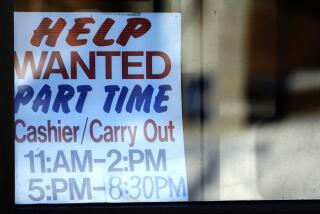Wages of Most Americans Fail to Reflect Better Economy, Study Says
- Share via
WASHINGTON — Most American workers, including professionals with college degrees, have yet to see increases in their pay despite the improving economy, according to a study released Saturday.
Declining wages, even among better-educated workers, and a growing income disparity between those with and without college degrees, are becoming fixtures of the 1990s and the economic recovery, said the study by the Economic Policy Institute, an organization partially funded by labor groups.
“On the one hand, we’re overcoming a lot of our short-term cyclical problems. We’re getting good job growth and unemployment is falling,” said Lawrence Mishel, an economist who co-authored the study. “Now we’re down to the fundamental long-term problems that were present in the economy in the 1980s.
“We’re talking about the middle-class squeeze. We’re talking about wages falling for a wide majority of workers,” he said.
The study, titled “The State of Working America, 1994-95,” says that from 1989 to 1993, median “real” wages, after adjustment for inflation, have fallen 2.6% overall and 4.6% among men. During the same period, wages for entry-level workers with high school diplomas fell 7.8% while earnings for new workers with college degrees dropped 6.1%.
Mishel said inflation-adjusted wages for college-educated men have fallen every year since 1987.
The study said also that new problems have emerged as well. For instance, it said the wages of male college-educated workers fell as fast as those of men with high school diplomas, nearly 5% from 1989-93.
More to Read
Inside the business of entertainment
The Wide Shot brings you news, analysis and insights on everything from streaming wars to production — and what it all means for the future.
You may occasionally receive promotional content from the Los Angeles Times.










